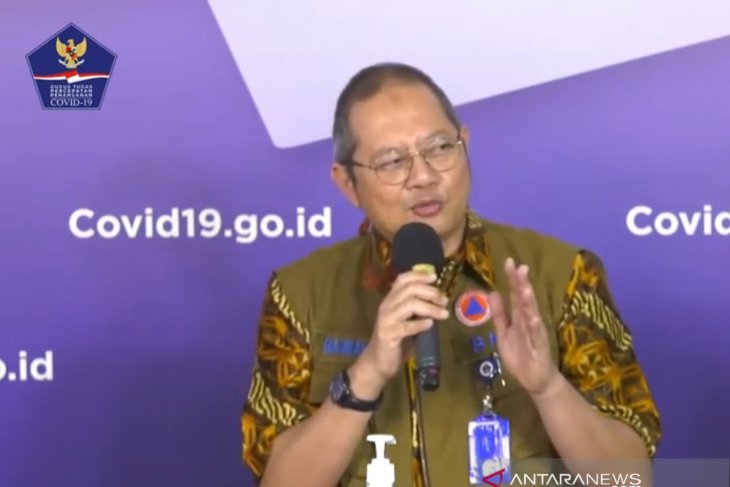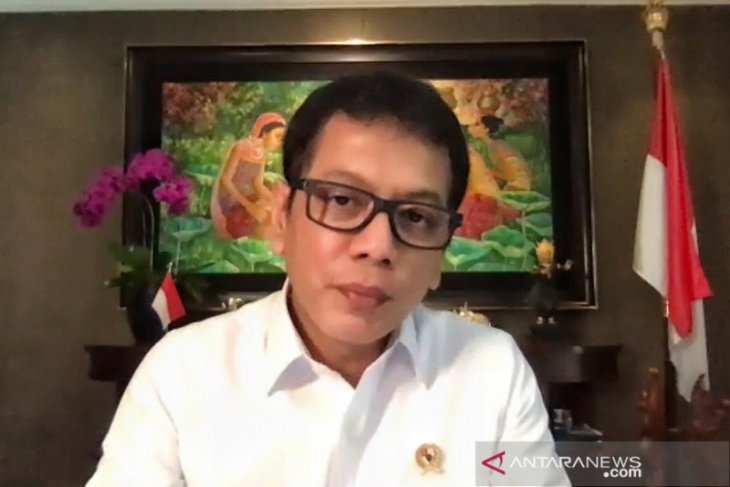Live Streaming
Program Highlight
Company Profile

Ani Hasanah
May

Chief of the BNPB Operation Control Center Bambang Surya Putra
Chief of the National Disaster Mitigation Agency (BNPB)'s Operation Control Center Bambang Surya Putra attached importance to data collection to fulfill the on-field needs quickly and accurately to facilitate prompt and efficient handling of the COVID-19 outbreak.
"This is because we are competing with the swiftly spreading COVID-19 pandemic. This COVID-19 is spreading faster than the speed we can handle," he stated during a press conference at the National Disaster Mitigation Agency (BNPB), Jakarta, on Wednesday.
Putra highlighted the need for collecting on-field data and information on the number of people that contracted COVID-19 to meet their needs and supplies suitably.
"This is since anything pertaining to information and data will influence the decision and will affect a COVID-19 disaster management operation," he expounded.
At the onset of the COVID-19 disaster in Indonesia, he acknowledged that the Regional Government (Pemda) mostly conducted the COVID-19 operational control. However, the regional government and task force are not necessarily ready with swift data communication.
"At that time, everyone was in a state of real shock. At that time, everyone was focused on handling," he stated.
Putra believes that handling can be done quickly, though data is also expected to be received swiftly so that the response team can make a precise calculation of the needs.
"Hence, we are optimistic of swift data collection, so we know which hospitals need more protective equipment and also reagents or other requirements," he stated.
"Hence, when we are slow, the handling will certainly be affected," he further remarked.
The coronavirus disease, which initially struck the Chinese city of Wuhan at the end of 2019, has since then spread to at least 202 countries and territories, including Indonesia, with a massive increase in the death toll.
The Indonesian government officially announced the country's first confirmed cases on March 2 this year. The ongoing COVID-19 pandemic has weakened the purchasing power of scores of Indonesian families, particularly those, who have lost their jobs.
Meanwhile, President Jokowi has highlighted the importance of fostering the spirit of "gotong royong", or mutual cooperation, in responding to the impact of the COVID-19 pandemic, arguing that the government cannot work single-handedly to combat the transmission of coronavirus infections.
The central and regional governments nationwide have also been striving persistently to flatten the coronavirus curve by imposing healthcare protocols and social restrictions.
To break the chain of transmission, large-scale social restrictions have been applied in several other cities, including Jakarta, Bogor, Depok, Tangerang, and Bekasi.
The central government has also banned homebound travel, locally known as “mudik,” during the fasting month of Ramadhan and the Idul Fitri holiday season. (ANTARA)
President Joko Widodo is optimistic that the government's social assistance programs would increase the public’s purchasing power, particularly to buy food.
"The government has launched cash social assistance for nine million families, direct cash assistance from the village fund for 11 million families, staple food card, and Family Hope Program (PKH). We are buoyant that those programs would boost the people's purchasing power," Widodo stated at the Merdeka Palace in Jakarta on Wednesday.
Quoting a report from the Central Statistics Agency, the head of state pointed to deflation of 0.13 percent in the staple food group in April 2020, an indication of which was owing to a decline in food demand.
The president believes that such conditions are indicative of the decreased purchasing power of the people for food.
The president also highlighted the significance of the availability and stability of prices of staple foods and reminded government officials to take precautionary measures in the wake of the Food and Agriculture Organization's (FAO’s) warning of the risk of a food crisis owing to the COVID-19 pandemic.
Center of Reform on Economics (CORE) Indonesia economist Muhammad Ishak Razak urged the government to increase the social assistance budget and number of beneficiaries to maintain the welfare of people living in poverty.
"CORE Indonesia emphasizes the importance of policies of the central and regional governments to maintain the level of welfare of the people, especially those living around the poverty line," he noted in an official statement received in Jakarta on Tuesday.
The effort was intended to serve as a precautionary measure against a potential surge in poverty estimated to be higher than the amount of social assistance prepared by the government during this time.
CORE Indonesia has forecast that the number of poor people in Indonesia would increase in the second quarter of 2020 by 5.1 million to reach 12.3 million in a severe scenario; 8.25 million, in a more severe scenario; and 12.2 million, in a very severe scenario.
The government has, so far, offered social assistance in varied forms, specifically through the Family Hope Program (PKH), with a budget allocation of Rp37.4 trillion, or Rp3.7 million annually for 10 million beneficiary families.
The staple food card, targeted for 20 million families, with a budget of Rp43.6 trillion, comprises Rp200 thousand monthly for nine months, including Rp600 thousand for 1,776 million families in Greater Jakarta (Jakarta Bogor, Depok, Tangerang, Bekasi) for three months.
Furthermore, Rp600 thousand in cash will be transferred to 5.6 million participants of the pre-employment card program for four months.
Razak remarked that the government should also continue to update the data of poor and vulnerable poor people, who deserve social assistance.
The social assistance database used by the regional government, in particular, the Integrated Social Welfare Data (DTKS), did not cover the community whose economic conditions had only deteriorated after the COVID-19 pandemic surfaced. (ANTARA)
May
Illustration - Cellular calls are also expected to rise by 5 percent during the fasting month of Ramadhan this year. (Pixabay)
Cellular operators are expecting a 20-percent surge in Internet traffic during the month of Ramadhan this year, with the COVID-19 outbreak contributing to higher Internet usage.
Most cellular operators usually experience an increase in traffic during the month of Ramadhan and this year, the traffic surge would also be boosted by the work-from-home policy that has been adopted by companies since March, according to cellular operators.
Vice president of corporate communications at Telkomsel, Denny Abidin, estimates that Internet traffic will increase by 20 percent during Ramadhan.
"Telkomsel has predicted that during the Ramadhan and Eid al-Fitr period, there will be a surge in broadband-based communication traffic of around 20 percent," he said in an official statement, received in Jakarta on Wednesday.
Meanwhile, XL Axiata's head of external communications, Henry Wijayanto, has also confirmed that there has been an increase in service traffic during Ramadhan compared to normal days.
"As regards data service, it is estimated to increase by around 15 to 20 percent," he said.
Cellular calls are also expected to rise by 5 percent during the fasting month.
Furthermore, mobile operator Smartfren has predicted an increase in Internet service traffic of between 10 and 15 percent during the month of Ramadhan, based on past experience.
"Based on Smartfren's experience, various efforts have been made to face the surge in the month of Ramadhan, with the current COVID-19 pandemic (taken into consideration). Traffic data has also increased with people working from home," said Smartfren's vice president of technology, Munir Syahda Prabowo.
Additionally, considering the latest development, Indonesia has estimated that Internet usage needs will increase by 20 percent compared to normal days.
To ensure quality and adequacy of network capacity during Ramadhan, cellular operators have taken various measures, such as managing traffic routes, alerting fast response teams, and operating mobile base transceiver stations. (ANTARA)
May
Minister of Tourism and Creative Economy Wishnutama Kusubandio said during a virtual conference on Wednesday(ANTARA)
The Ministry of Tourism and Creative Economy is readying numerous protocols that can be applied by the film industry to ensure smooth functioning amid the coronavirus pandemic.
In collaboration with the Indonesian Film Agency (BPI), the Ministry of Tourism and Creative Economy (Kemenparekraf) has begun discussions on challenges faced by film workers in the country and prepared protocols to rescue the film industry reeling from the impact of the pandemic.
"COVID-19 has posed severe challenges to the film industry, not only cinema but also production. We are providing various protocols to deal with the new conditions," Minister of Tourism and Creative Economy Wishnutama Kusubandio stated during a virtual conference on Wednesday.
After drafting, a protocol will be tested to cover health and safety aspects.
"If the protocol is ready, we will conduct simulations and trials, as economic life must continue. This is prepared for ensuring better conditions than what they are today," he explained.
Meanwhile, Dewi Umaya, deputy chairperson of BPI, remarked that her party had, until now, continued to coordinate with the government to prepare protocols that will later be forwarded to stakeholders.
"After being compiled in the near future, the stakeholders will be notified of it. These protocols must undoubtedly be in accordance with all parties. Later, this protocol will be sent to the government and seen by the Task Force," Umaya remarked.
The Ministry of Tourism and Creative Economy and the Tourism and Creative Economy Agency lauded the inventions and new trends started by the nation's creative minds that have chosen to be productive in the midst of the COVID-19 pandemic.
Acting Deputy of Digital Economy and Creative Products Joshua Simandjuntak had earlier stated that all sub-sectors of the creative economy were bearing a major brunt of the COVID-19 pandemic. Currently, he noted that the situation was no longer merely a health emergency but also an economic emergency.
To this end, he lauded creative individuals, who are able to adapt and also create new trends and opportunities.
"In a situation like today, we need to stay productive, even within our limitations, and right now, we need to adapt," he noted. (ANTARA)




